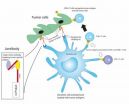(Press-News.org) Three promising biomarkers being studied to detect Alzheimer's disease in its early stages appear to undergo a surprising shift as patients develop symptoms of dementia, researchers at Washington University School of Medicine in St. Louis report.
Scientists use the biomarkers to assess brain changes linked to the disease in research volunteers. The levels of markers of neuronal injury increase in the spinal fluid for a decade or more before the onset of dementia, but in a new twist, the research shows for the first time that they later reverse course, decreasing as symptoms of memory loss and mental decline appear.
The results appear online March 5 in Science Translational Medicine.
"We're not sure why this reversal occurs, but understanding it may be very important for clinical trials of drugs to treat or prevent Alzheimer's," said senior author Anne Fagan, PhD, research professor of neurology. "Changes in the levels of these biomarkers likely will be among the criteria we use to assess the success or failure of Alzheimer's drugs, so we need to know how these biomarkers normally behave in the absence of treatment."
Motivated by the realization that Alzheimer's damages the brain for a decade or more before it causes dementia, researchers have identified several biomarkers of the disease in patients before they develop symptoms. They hope to use the biomarkers to diagnose patients and start treatment long before the onset of problems with memory and other brain functions that characterize dementia.
Fagan and her colleagues studied data from the Dominantly Inherited Alzheimer's Network (DIAN), a multinational research project led by Washington University. All DIAN participants come from families affected by genetic mutations that cause rare inherited forms of Alzheimer's. Carriers of their family's mutation can develop symptoms of mental decline as early as their 30s.
DIAN participants regularly are evaluated using a variety of tests, including analyses of Alzheimer's biomarkers in their spinal fluid. For the new study, Fagan and her coauthors looked at three injury-related biomarkers in spinal fluid samples collected at multiple evaluations of 26 DIAN participants. All the participants had an Alzheimer's-causing mutation.
Two of the biomarkers, tau and p-tau, are structural proteins that form the neurofibrillary tangles seen in the brains of Alzheimer's patients; the third is a neuronal calcium sensor called VILIP-1. Levels of the three biomarkers increase after neurons are injured and are linked to decline of cognitive function. Evidence suggests that as Alzheimer's assaults the brain, dying cells release the biomarkers, freeing them to be washed into the spinal fluid.
As expected, levels of the biomarkers increased over time in participants who had not yet developed dementia. But the researchers were surprised to find that in most participants who had dementia, levels of the three biomarkers decreased over time. The drop in levels was relatively small but consistent and statistically significant.
"This was very interesting, particularly given that previous studies have shown that other indicators of Alzheimer's disease, such as brain shrinkage, continue after the onset of dementia," Fagan said.
Fagan speculated that increasing levels of the biomarkers prior to dementia likely reflect an intense stage of cell death, while decreasing levels as dementia begins indicate a slowing of this process. However, it's also possible that such reductions result from a decrease in the number of remaining brain cells that have yet to be killed by Alzheimer's, she said.
To advance the research, the scientists are gathering data on new DIAN enrollees and continuing to follow participants in the current study.
"Our findings are limited both by the small number of participants we studied and by the fact that we only had a few years of longitudinal follow-up," Fagan said. "Additional data taken over longer periods of time will help us draw more definitive conclusions."
Additional research also is needed to learn whether levels of the biomarkers undergo a similar change in patients with the more common sporadic forms of the disease, which are typically diagnosed later in life.
INFORMATION:
Funding from the National Institutes of Health (NIH), the National Institute on Aging, the Dominantly Inherited Alzheimer's Network, the DIAN Pharma Consortium and other sources supported this research.
Fagan AM, Xiong C, Jasielec MS, Bateman RJ, Goate AM, Benzinger TLS, Ghetti B, Martins RN, Masters CL, Mayeux R, Ringman JM, Rossor MN, Salloway S, Schofield PR, Sperling RA, Marcus D, Cairns NJ, Buckles VD, Ladenson JH, Morris JC, Holtzman DM. The Dominantly Inherited Alzheimer Network. Longitudinal change in CSF biomarkers in autosomal-dominant Alzheimer's disease. Science Translational Medicine, online March 5, 2014.
Washington University School of Medicine's 2,100 employed and volunteer faculty physicians also are the medical staff of Barnes-Jewish and St. Louis Children's hospitals. The School of Medicine is one of the leading medical research, teaching and patient-care institutions in the nation, currently ranked sixth in the nation by U.S. News & World Report. Through its affiliations with Barnes-Jewish and St. Louis Children's hospitals, the School of Medicine is linked to BJC HealthCare.
Biomarkers of cell death in Alzheimer's reverse course after symptom onset
2014-03-05
ELSE PRESS RELEASES FROM THIS DATE:
An inventive new way to profile immune cells in blood
2014-03-05
ROVIDENCE, R.I. [Brown University] — When a person becomes sick or is exposed to an unwelcome substance, the body mobilizes specific proportions of different immune cells in the blood. Methods of discovering and detecting those profiles are therefore useful both clinically and in research. In a new paper in the journal Genome Biology, a team of scientists describes a new and uniquely advantageous way to detect them.
All the current means of counting immune cells in a blood sample require whole cells, said Karl Kelsey, professor of epidemiology at Brown and corresponding ...
Novel cancer vaccine holds promise against ovarian cancer, mesothelioma
2014-03-05
A novel approach to cancer immunotherapy – strategies designed to induce the immune system to attack cancer cells – may provide a new and cost-effective weapon against some of the most deadly tumors, including ovarian cancer and mesothelioma. Investigators from the Massachusetts General Hospital (MGH) Vaccine and Immunotherapy Center report in the Journal of Hematology & Oncology that a protein engineered to combine a molecule targeting a tumor-cell-surface antigen with another protein that stimulates several immune functions prolonged survival in animal models of both ...
Hungry for 'likes': Frequent Facebook use linked to eating disorder risk, study finds
2014-03-05
TALLAHASSEE, Fla. — Frequent Facebook users might be sharing more than party pictures, vacation videos and shameless selfies — they also share a greater risk of eating disorders, according to a new study led by Florida State University researchers.
Psychology Professor Pamela K. Keel studied 960 college women and found that more time on Facebook was associated with higher levels of disordered eating. Women who placed greater importance on receiving comments and "likes" on their status updates and were more likely to untag photos of themselves and compare their own photos ...
Prenatal nicotine exposure may lead to ADHD in future generations
2014-03-05
TALLAHASSEE, Fla. — Prenatal exposure to nicotine could manifest as attention deficit hyperactivity disorder in children born a generation later, according to a new study by Florida State University College of Medicine researchers.
Professors Pradeep G. Bhide and Jinmin Zhu have found evidence that ADHD associated with nicotine can be passed across generations. In other words, your child's ADHD might be an environmentally induced health condition inherited from your grandmother, who may have smoked cigarettes during pregnancy a long time ago. And the fact that you never ...
A single gene, doublesex, controls wing mimicry in butterflies
2014-03-05
A single gene regulates the complex wing patterns, colors and structures required for mimicry in swallowtail butterflies, report scientists from the University of Chicago, March 5 in Nature. Surprisingly, the gene described, doublesex, is already well-known for its critical role in sexual differentiation in insects.
"Conventional wisdom says that it should be multiple genes working together to control the whole wing pattern of a butterfly," said Marcus Kronforst, Neubauer Family Assistant Professor of Ecology & Evolution at the University of Chicago and senior author ...
Ultra sensitive detection of radio waves with lasers
2014-03-05
Radio waves are used for many measurements and applications, for example, in communication with mobile phones, MRI scans, scientific experiments and cosmic observations. But 'noise' in the detector of the measuring instrument limits how sensitive and precise the measurements can be. Now researchers at the Niels Bohr Institute have developed a new method where they can avoid noise by means of laser light and can therefore achieve extreme precision of measurements. The results are published in the prestigious scientific journal, Nature.
'Noise' in the detector of a measuring ...
Livestock can produce food that is better for the people and the planet
2014-03-05
With one in seven humans undernourished, and with the challenges of population growth and climate change, the need for efficient food production has never been greater. Eight strategies to cut the environmental and economic costs of keeping livestock, such as cows, goats and sheep, while boosting the quantity and quality of the food produced have been outlined by an international team of scientists.
The strategies to make ruminant - cud-chewing - livestock a more sustainable part of the food supply, led by academics at the University of Bristol's School of Veterinary ...
ALS-linked gene causes disease by changing genetic material's shape
2014-03-05
Johns Hopkins researchers say they have found one way that a recently discovered genetic mutation might cause two nasty nervous system diseases. While the affected gene may build up toxic RNA and not make enough protein, the researchers report, the root of the problem seems to be snarls of defective genetic material created at the mutation site.
The research team, led by Jiou Wang, Ph.D., an assistant professor of biochemistry and molecular biology and neuroscience at the Johns Hopkins University School of Medicine, reports its finding March 5 on the journal Nature's ...
Study aims to define risk factors for falls in post-menopausal women
2014-03-05
ROSEMONT, Ill.–A new study appearing in the March issue of the Journal of Bone and Joint Surgery (JBJS) showed that women with distal radius (wrist) fractures had decreased strength compared to similar patients without fractures. This could explain why these women were more likely to fall and might sustain future fractures.
The investigators used a variety of balance and strength tests combined with patient-provided information about walking habits to evaluate the physical performance and risk of falls for post-menopausal women with and without previous wrist fractures. ...
UF researchers find drug therapy that could eventually reverse memory decline in seniors
2014-03-05
GAINESVILLE, Fla. — It may seem normal: As we age, we misplace car keys, or can't remember a name we just learned or a meal we just ordered. But University of Florida researchers say memory trouble doesn't have to be inevitable, and they've found a drug therapy that could potentially reverse this type of memory decline.
The drug can't yet be used in humans, but the researchers are pursuing compounds that could someday help the population of aging adults who don't have Alzheimer's or other dementias but still have trouble remembering day-to-day items. Their findings will ...




